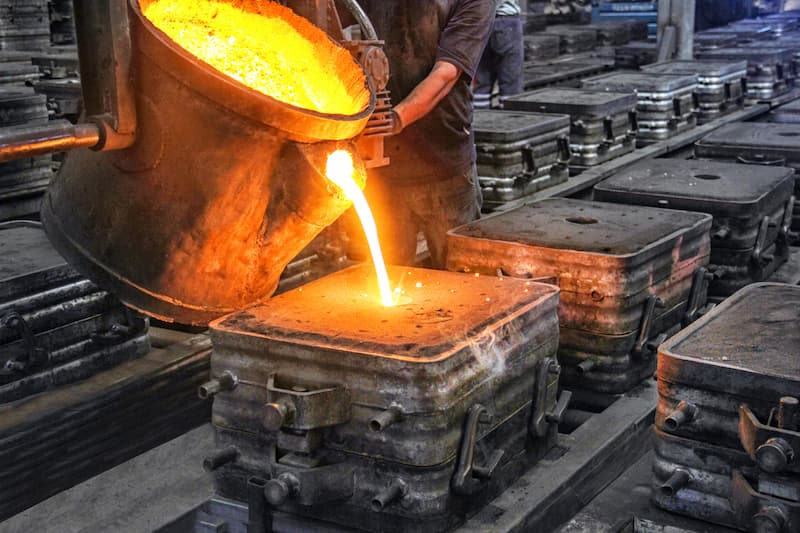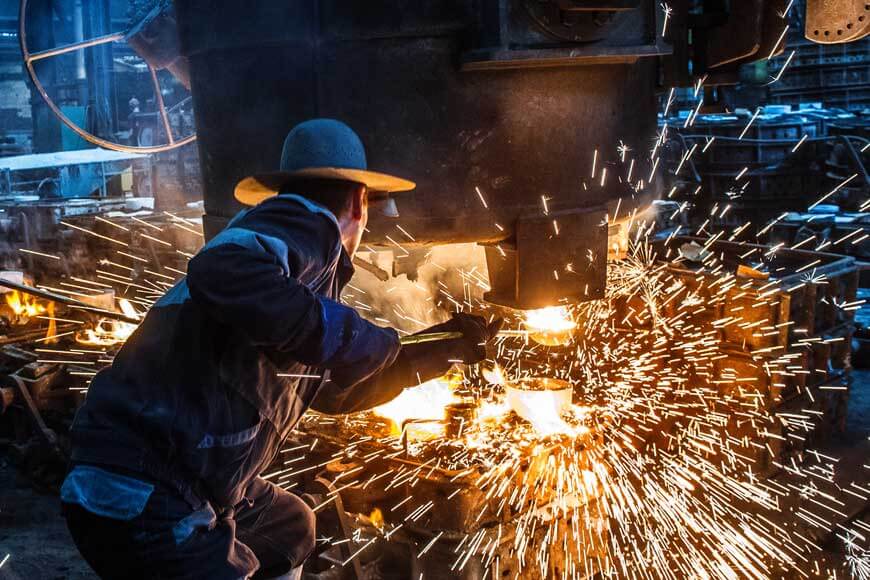What’s Next for Metal Casting in Digital Foundries
Wiki Article
A Comprehensive Guide to Metal Casting: Advantages and Services Provided by Foundries
Metal casting is a vital process in numerous industries, offering various benefits via the services of foundries. These facilities change molten metal right into accurate and resilient elements, catering to specific client demands. By employing advanced modern technologies, shops ensure quality and performance in manufacturing. Nonetheless, the details of metal casting and the varied strategies included raise crucial questions concerning its function in modern manufacturing. What developments lie ahead in this important field?Recognizing the Metal Casting Process
The metal casting process is an essential method utilized in making to produce complex forms and components. This technique involves putting liquified metal into a mold created to form the desired things. The process starts with pattern development, which functions as a theme for the mold and mildew. Aluminum Casting. Numerous products, such as sand, metal, or ceramic, are utilized for mold-making, depending upon the certain requirements of the casting
Once the mold is ready, molten metal is put right into it and allowed to cool and solidify. After solidification, the mold is gotten rid of, disclosing the cast part. Numerous methods, including sand casting, investment casting, and pass away casting, are used, each suited to different applications and materials. Quality control actions, such as examinations and testing, are important to ensure the end product fulfills requirements. Overall, the metal casting process plays an essential role in producing parts for industries varying from automotive to aerospace.
Secret Benefits of Metal Casting
Metal casting uses significant advantages that make it a recommended production approach in different markets. Its design adaptability and precision enable intricate forms, while cost-efficient mass production enhances efficiency. Furthermore, the convenience and toughness of products utilized in casting add to the resilience of the end products.Style Adaptability and Accuracy
Launching remarkable style flexibility and precision, metal casting permits engineers and designers to create elaborate forms and attributes that would be difficult or challenging to accomplish with various other manufacturing approaches. This ability enables the manufacturing of complex geometries, inner frameworks, and great information that enhance product performance and aesthetics. Additionally, different casting strategies, such as sand casting, financial investment casting, and die casting, give further alternatives for modification, fitting diverse product residential or commercial properties and task demands. The adaptability of molds permits modifications throughout the design phase, simplifying the shift from concept to end product. Inevitably, metal casting stands apart for its capacity to supply high-precision components, making it a vital procedure in markets ranging from automotive to aerospace and beyond.Economical Mass Production
Affordable automation stands as one of the key advantages of metal casting, enabling makers to generate big amounts of elements at a lower expense per device. This effectiveness develops from the capability to develop detailed mold and mildews that can be reused numerous times, substantially decreasing configuration and functional expenses. Furthermore, metal casting processes, such as sand casting and die casting, permit high throughput, making it practical to satisfy the needs of massive manufacturing runs. The minimized product waste and energy consumption further boost price financial savings, making metal casting an appealing alternative for sectors needing bulk parts. In general, the economical nature of metal casting placements it as a favored technique for producers intending for economic efficiency in their production procedures.Product Versatility and Strength
Among the standout attributes of metal casting is its exceptional product convenience, which enables for using a wide variety of alloys and steels. This adaptability makes it possible for producers to select materials that best fit their certain applications, from aluminum and bronze to iron and steel. Each metal uses distinct properties, including varying degrees of toughness, rust resistance, and thermal conductivity. As a result, metal casting can generate components that satisfy strict performance requirements across diverse sectors, such as automobile, aerospace, and building and construction. In addition, the stamina of actors metals can be boosted with numerous therapy processes, guaranteeing durability and longevity. Aluminum Foundry. On the whole, the combination of product versatility and intrinsic strength makes metal casting a favored option for producing top quality elementsTypes of Metal Casting Techniques
Metal casting includes a range of methods that provide to different manufacturing requirements and material residential properties. Usual methods consist of sand casting, which uses a sand mold and mildew for complicated forms, and financial investment casting, understood for its precision and surface area coating. Die casting is an additional method that employs high-pressure injection of molten metal right into molds, suitable for mass production of small parts.Covering molding offers a quicker alternate, making use of a resin-coated sand to produce thin-walled molds, while lost foam casting permits detailed designs without the requirement for a core.
Additionally, constant casting is used for generating lengthy areas of metal, such as bars or sheets, by solidifying molten metal in a continuous procedure. Each strategy is and offers one-of-a-kind benefits selected based on elements like the called for information, manufacturing volume, and material type, making sure premium outcomes in metal fabrication across numerous industries.
The Role of Foundries in Metal Casting
Foundries play a critical role in the metal casting procedure, working as the centers where liquified metal is transformed into completed items. These specialized facilities are furnished with the required tools and technologies to deal with different steels, ensuring top quality end results. Factories are accountable for numerous essential features, including melting the metal, putting it into molds, and enabling it to strengthen.Additionally, they preserve strict safety and environmental requirements to shield employees and lessen eco-friendly impact. Proficient service technicians and engineers collaborate to maximize casting procedures, boosting efficiency and minimizing waste. Foundries likewise engage in quality assurance measures, ensuring that the final items satisfy particular tolerances and specifications. This top quality assurance is crucial for markets that count on specific components, such as vehicle and aerospace. Because of this, foundries add substantially to the total manufacturing landscape, enabling innovation and growth throughout different sectors.
Custom-made Metal Casting Providers
Customized metal casting services offer tailored design remedies that satisfy specific customer demands. These services also provide material option experience, guaranteeing the ideal metal is chosen for the preferred application. Such flexibility and understanding enhance the total quality and performance of the final product.
Customized Design Solutions
Customized style services in metal casting give producers with the adaptability to create components that fulfill certain performance and aesthetic demands. Factories offer tailored solutions that enable clients to specify measurements, forms, and surface coatings to achieve preferred end results. This customization process usually consists of cooperation in between designers and designers, ensuring that the last items align with operational demands and market criteria. Advanced innovations, such as computer-aided layout (CAD) and simulation software program, allow specific modeling and testing of elements before manufacturing, decreasing errors and improving performance. By leveraging tailored style solutions, businesses can enhance capability while lowering waste and expenses, inevitably resulting in an extra one-upmanship in the marketplace. This flexibility is necessary for industries needing distinct applications and specs.Material Option Competence
When picking materials for metal casting, know-how plays a crucial role in guaranteeing that the right selection aligns with both efficiency needs and cost-effectiveness. Foundries utilize skilled professionals that recognize the residential properties of various steels and alloys, permitting them to advise perfect materials for specific applications. Variables such as stamina, deterioration resistance, and thermal conductivity are thoroughly considered to satisfy the customer's requirements. Furthermore, market fads and improvements in material scientific research educate these choices, enabling shops to remain affordable. By leveraging their know-how, foundries can assist clients in guiding with facility product choices, ultimately leading to boosted product quality Metal Casting and minimized production expenses. This specific knowledge is vital for attaining successful end results in personalized metal casting services.Quality Assurance in Metal Casting
Quality control in metal casting is essential to ensure that the last products fulfill the called for requirements and performance standards. Shops use a variety of techniques and methods to ensure the finest of cast elements. This procedure begins with rigorous material evaluations, validating that resources adhere to sector standards. Throughout the casting process, real-time tracking and testing are performed to examine parameters such as temperature level, mold and mildew honesty, and dimensional accuracy.
Applications of Metal Castings Throughout Industries
Metal castings play a crucial role in various markets, functioning as the foundation for countless applications. In the vehicle sector, cast parts such as engine blocks and transmission real estates are required for lorry efficiency and dependability. The aerospace industry counts on precision spreadings for crucial parts that assure security and efficiency in flight. Furthermore, the construction sector makes use of metal spreadings for components, fittings, and structural elements, enhancing the toughness of structures and framework.The energy sector benefits from castings used in wind turbine blades and various other devices important for power generation. The medical field additionally utilizes metal spreadings in gadgets and instruments, showing the versatility of this production procedure. Overall, metal spreadings are integral to the capability and advancement of diverse sectors, showcasing their relevance in contemporary innovation and facilities growth
Often Asked Concerns
What Products Are Generally Made Use Of in Metal Casting?
Usual materials made use of in metal casting include aluminum, iron, bronze, steel, and brass. Each product uses special properties suitable for different applications, enabling makers to select the very best choice based on strength, rust, and weight resistance.How much time Does the Metal Casting Refine Generally Take?
The metal casting procedure normally takes a number of hours to a few days, relying on variables such as the intricacy of the style, sort of metal used, and the details casting approach utilized by the foundry.
What Is the Environmental Influence of Metal Casting?
The ecological impact of metal casting consists of energy consumption, exhausts, and waste generation. Shops usually carry out procedures to mitigate these results, such as recycling products and making use of cleaner innovations to reduce their eco-friendly impact.Can Metal Casting Be Provided For Small-Scale Projects?
Metal casting can without a doubt be done for small-scale jobs. Numerous foundries deal with such requirements, offering customized remedies that fit limited manufacturing runs while maintaining high quality and accuracy in the final products.What Are the Precaution in Metal Casting Foundries?
In metal casting foundries, security actions include individual protective devices, correct ventilation, training on equipment use, emergency treatments, regular maintenance checks, and adherence to market security criteria to minimize risks related to liquified metal and harmful products.In addition, metal casting processes, such as sand casting and die casting, allow for high throughput, making it possible to satisfy the needs of large manufacturing runs. One of the standout features of metal casting is its exceptional material flexibility, which allows for the usage of a wide array of steels and alloys. Furthermore, constant casting is made use of for producing lengthy sections of metal, such as bars or sheets, by strengthening molten metal in a constant procedure. Factories play an essential function in the metal casting process, offering as the centers where liquified metal is changed into finished items. Typical materials used in metal casting include light weight aluminum, iron, bronze, steel, and brass.
Report this wiki page